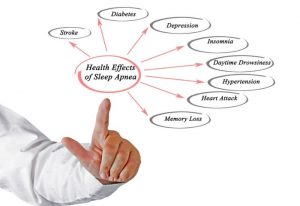Sleep apnea is a sleep disorder in which an individual stops breathing repeatedly throughout the night. The period during which breathing stops may only last for a few seconds, but it’s long enough to disturb the sleep rhythm. Those with sleep apnea may not feel well-rested in the morning and commonly experience feelings of fatigue or drowsiness throughout the day.
Sleep apnea can do more than just disrupt your sleep; it is a serious disorder that can boost several physical health risks. Now, new research has also found a link between sleep apnea and depression.
Sleep Apnea Explained
 There are two types of sleep apnea: obstructive sleep apnea (OSA) and central sleep apnea (CSA). In obstructive sleep apnea, a physical blockage in the airway prevents an individual from breathing properly while asleep. Once he or she turns the head or moves into another position, the blockage is usually alleviated and normal breathing resumes.
There are two types of sleep apnea: obstructive sleep apnea (OSA) and central sleep apnea (CSA). In obstructive sleep apnea, a physical blockage in the airway prevents an individual from breathing properly while asleep. Once he or she turns the head or moves into another position, the blockage is usually alleviated and normal breathing resumes.
Central sleep apnea involves the messages the brain sends to the rest of the body. With CSA, the brain fails to send the proper signals to the muscles in the airway, causing breathing to stop. However, once the body realizes there’s a problem, an alarm is sent to the brain and normal breathing typically resumes.
In addition to heart disease and fatigue, sleep apnea can cause a number of other health problems. It has been found to play a role in metabolic syndrome, hypertension, stroke and even glaucoma. It has also been linked to problems involving memory and concentration.
Some risk factors for sleep apnea include:
- sleeping flat on your back
- being overweight or obese
- chronic sinusitis
- menopause
- Down syndrome
- enlarged adenoids or tonsils
- smoking
- family history of sleep apnea
Causes of Sleep Apnea
It’s possible to suffer from sleep apnea and not realize it. In most cases of sleep apnea, the individual will stop breathing and resume normal breathing without the interruption causing them to wake. Unless a spouse or partner happens to observe an occurrence, the affected person may not suspect that anything is wrong. The symptoms of sleep apnea may not seem severe on their own, but experiencing several of these symptoms can take its toll on the body and may indicate that you should get checked for sleep apnea. Common symptoms include:
- insomnia
- loud snoring
- a frequent need to urinate throughout the night
- awakening with a sore throat or dry mouth
- headache
- feeling irritable
- heartburn
- decreased sexual appetite
Understanding the Nature of Depression
Occasionally feeling sad or down is normal and happens to all of us from time to time, but for over seven percent of people over 12 years of age, those feelings may persist for a longer period of time. This is the telltale sign of depression, a condition the World Health Organization says affects 350 million people across the globe. In addition to feeling sad or down, someone suffering from depression may also lose interest in activities that once gave them pleasure or joy.
Other symptoms of depression include lack of appetite and unintentional weight loss, insomnia or insufficient sleep, hypersomnia, or excessive sleeping, restlessness, delayed speech and slowed movements, guilt or feelings of worthlessness, impaired concentration and decision-making abilities and repeated thoughts about death or suicide.
There isn’t an easy cure for depression. Typically, it requires long-term counseling with a psychotherapist. Treatment may also include prescription medication, which can help alleviate some of the symptoms. Some people also find it helpful to join peer support groups, where they can discuss their feelings and experiences with others who suffer from similar types of depression.
New Study Links Sleep Apnea and Depression

A new study conducted at Georgia’s Augusta University suggests that there’s a link between obstructive sleep apnea and depression. In cases where this holds true, treating sleep apnea may help alleviate the depression as well. This is significant, as according to Dr. William V. McCall, who co-authored the study, over half of the people with major depression also suffer from obstructive sleep apnea.
In the study, the researchers recruited 125 people with depression who also suffered from insomnia. The original purpose of this study was to determine if treating the insomnia would alleviate the depression. However, in evaluating the subjects, they found that many of them — 17 of the 125 — also suffered from undiagnosed sleep apnea.
Although these subjects comprised 14 percent of the group, most of them showed no obvious symptoms of the sleep disorder. Daytime drowsiness and obesity were not prevalent, which was why these individuals weren’t initially excluded from the study. Further investigation found that up to 52 of the study participants had major depression that had proven resistant to treatment. Within that group, eight of those subjects were also found to suffer from obstructive sleep apnea.
In the past, it has been found that underlying conditions, which may include carotid artery disease, hypothyroidism and cancer, may explain why depression can be resistant to treatment. However, Dr. McCall believes the answer may be simpler and suggests a sleep test should be conducted before recommending an MRI to rule out other more severe conditions. He points out that people with obstructive sleep apnea rarely respond well to anti-depressant drugs, which may suggest that treating obstructive sleep apnea will be more effective in resolving the condition of depression.
Other Factors May also Play a Role
This study is promising, but further research is needed. While the study did find a link between sleep apnea and depression, there are other factors that may also make people resistant to anti-depressants. For instance, people who are taking other medications, particularly corticosteroids and beta-blockers, don’t respond well to the medications used to treat depression. Additional research may find that many factors play a part in determining how effective medication will be in treating depression.







